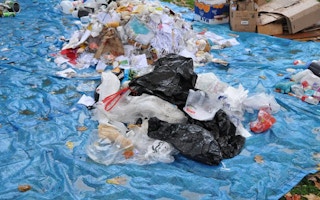If Singapore residents could see the amount of rubbish the wealthy city-state generates in a single day, maybe they would dispose of their trash more responsibly and reduce how much they consume.
To continue reading, subscribe to Eco‑Business.
There's something for everyone. We offer a range of subscription plans.
- Access our stories and receive our Insights Weekly newsletter with the free EB Member plan.
- Unlock unlimited access to our content and archive with EB Circle.
- Publish your content with EB Premium.
That’s the idea behind CleanSG Day, an initiative from Singapore’s Public Hygeine Council (PHC) that involves leaving the usually meticulous city-state uncleaned for a day—to shock complacent residents into cleaning up their act.
Singapore employs an army of 58,000 cleaners to clear up the 720 km² island’s housing estates, roads, walkways and waterways three times a day, beginning at dawn. But for one day next year, Singapore’s cleaners will be given the day off.
Instead, residents will be tasked to clean a city that generates 21,000 tonnes of rubbish every day, the majority of which is incinerated in waste-to-energy plants and only a small percentage of which is recycled.
“
We are a cleaned city rather than a clean city.
Louis Ng, Member of Parliament, Nee Soon
The idea has been tested before in the district level, but next year will be the first time that Singapore’s cleaners have been demobilised nationwide.
Clean or cleaned?
One district in which it has been trialled is Nee Soon, the constituency of Louis Ng, an environmentalist turned politician who launched a district-level zero waste masterplan last year.
Among Ng’s initiatives—which include the phasing out of single-use plastic from council meetings and events, sourcing only renewable energy, and waging war on food waste—was to leave parts of the Nee Soon East ward uncleaned for a day by professional cleaners; residents cleaned up instead.
The initiative “gave the residents who helped to clear the trash on that day a good idea about how much trash we generate, and how we are a cleaned city rather than a clean city,” Ng told Eco-Business.
April 26 has been slated for National CleanSG Day 2020. PHC confirmed that on this day, there will be no cleaners deployed at public housing estate grounds.
“We will encourage residents to keep their shared spaces clean by not littering and by conducting clean-ups where possible. Our objective is to promote greater awareness on the amount of litter thrown indiscriminately and encourage everyone not to litter,” the council said in a statement.
PHC added that it engaged environmental groups to clean up the city on a regular basis, and would be working with these groups from the launch event on 26 April throughout the month of May.
“Getting Singaporeans to clean up after themselves is an attempt to inculcate social habits that can be commensurate with Singapore’s economic success,” an explainer on PHC’s website reads. “Citizens must take personal responsibility for public hygiene in a socially advanced nation.”
PHC warned that “the presence of a large number of these workers [cleaners] will inure Singaporeans to their dependence on cleaners,” so greater public awareness was needed to remind people of their individual responsibility to keep the city clean.
PHC did not comment on whether Singapore’s cleaners will be paid on National CleanSG Day.








